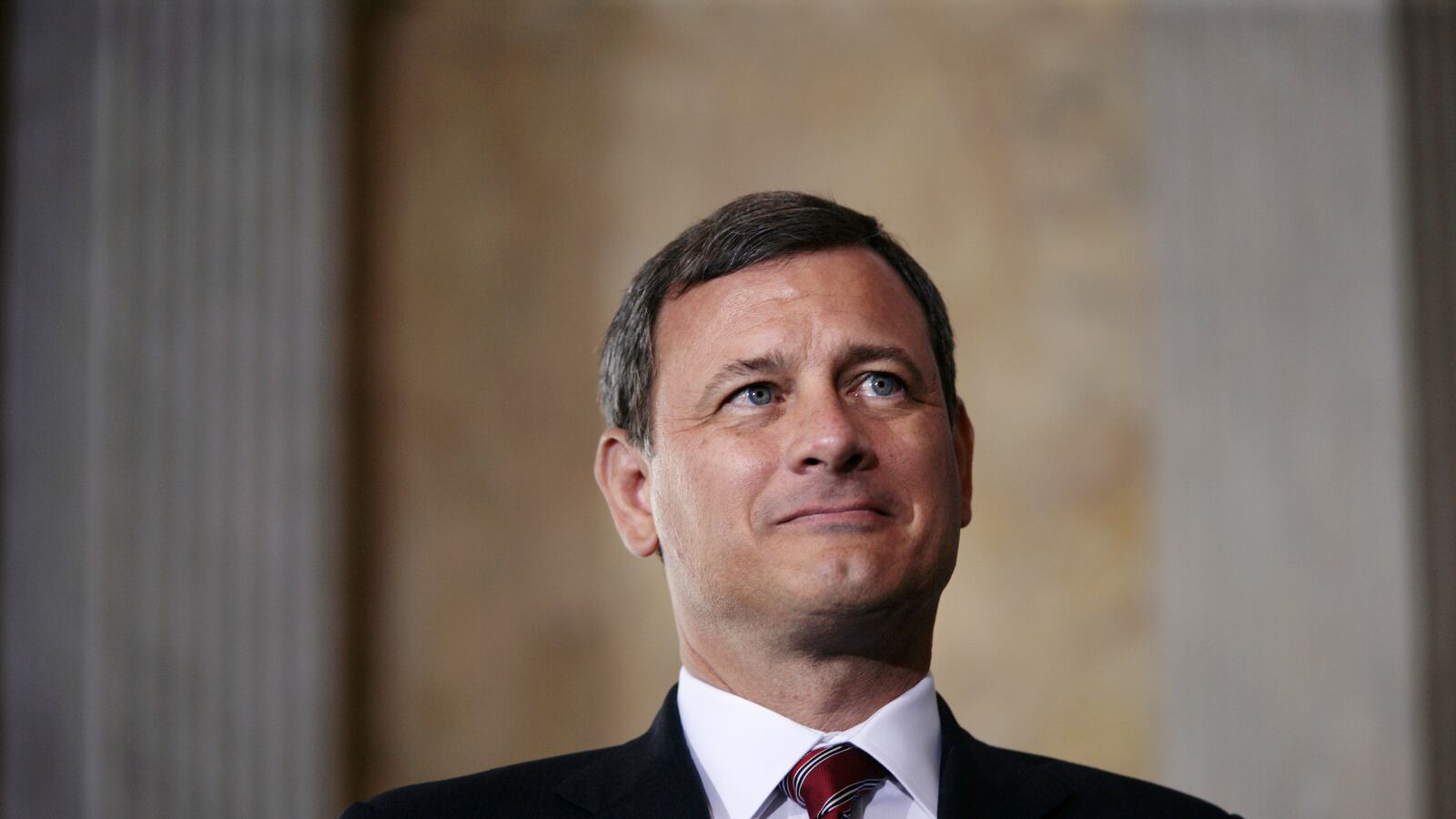The liberal lionization of John Roberts is roaring through the media.
He is, after all, the man who saved Obamacare for a president who opposed his confirmation.
One moment he is the bête noire of the left, a right-wing legal hack who lied about being a neutral umpire, and the next he is a profile in courage, rising above petty partisanship to do the right thing.
Is this a classic case of what many on the right carp about—that conservatives are depicted as having “grown” and “evolved” only when they move to the left?
In some ways, sure. But the story is more complicated than that, turning on a justice’s nuanced view of his role and that of the high court.
And while some conservatives are angry at Roberts—a few have even called him a traitor—the right-wing media have been remarkably restrained in reporting on the chief justice’s apostasy.

But make no mistake: much of the MSM is in gushing mode. The New York Times offered this front-page valentine:
“To be sure, the chief justice considers himself the custodian of the Supreme Court’s prestige, authority and legitimacy, and he is often its voice in major cases…But almost no one thought that he would provide the fifth vote, joining only the liberals, to uphold a Democratic president’s signal legislative achievement.”
Politico has him casting a giant shadow:
“This was Roberts’s moment to leave his imprint on the court, and he seized that moment. His action did not simply cross ideological lines: Roberts appointed himself the architect of the majority opinion holding that the landmark health care law could be justified as an exercise of Congress’s power to tax.
“His ruling left liberal legal scholars and Obama supporters downright giddy.”
And New Republic legal analyst Jeffrey Rosen portrays him as a giant among men:
“For bringing the court back from the partisan abyss, Roberts deserves praise not only from liberals but from all Americans who believe that it’s important for the court to stand for something larger than politics. On Thursday, Roberts did precisely what he said he would do when he first took office: He placed the bipartisan legitimacy of the court above his own ideological agenda…Roberts’ decision was above all an act of judicial statesmanship.”
By contrast, few on Fox News took on Roberts directly, aiming their ammunition instead at the evils of Obamacare. Even this scolding by National Review exercises, well, judicial restraint:
“If Roberts believes that this tactic avoids damage to the Constitution because it does not stretch the Commerce Clause to justify a mandate, he is mistaken. The Constitution does not give the Court the power to rewrite statutes, and Roberts and his colleagues have therefore done violence to it. If the law has been rendered less constitutionally obnoxious, the Court has rendered itself more so. Chief Justice Roberts cannot justly take pride in this legacy.”
Conservatives, it seems to me, are in something of a box. For seven years they have cheered as Roberts has voted almost in lockstep with the Scalia wing to support government and corporate power and, in the Citizens United case, unlimited special-interest campaign spending. Had Anthony Kennedy written the opinion upholding Obamacare, they could have attacked him as a typical turncoat. But it was their guy, a Bush appointee, a Reagan White House aide, saying the Obama law they love to hate passes constitutional muster.
Roberts had to stretch to achieve the desired result, saying the penalty for failing to fulfill the insurance mandate could be justified as a tax but not under the interstate commerce clause, which conservatives want to limit. But by joining Ruth Bader Ginsburg, Elena Kagan, Sonia Sotomayor, and Stephen Breyer, Roberts was reaching for something larger.
Based on conversations with people who know him or have followed him closely, I believe Roberts did not want the court to be in the position of overturning a major law passed by Congress. He instinctively understands that this would be seen as a blatantly partisan act by a court already suspected of political motives. And so he groped his way toward a narrow ruling that would preserve the health-care law without breaking major legal ground.
We are talking here about the government’s taxing authority, in a country where you cannot drive a car without getting auto insurance. Whatever the flaws of Obamacare, it mirrors the approach of Romneycare, in which the former Massachusetts governor defended a tax penalty on health insurance free riders—which hardly puts the president’s law way outside the mainstream.
Conservative columnist Charles Krauthammer, while unhappy with the ruling, pretty much nails Roberts’s role:
“Why did he do it? Because he carries two identities. Jurisprudentially, he is a constitutional conservative. Institutionally, he is chief justice and sees himself as uniquely entrusted with the custodianship of the court’s legitimacy, reputation, and stature.”
Not everyone on the right has stayed civil. In a sad rant picked up by the Drudge Report, inflammatory radio talker Michael Savage said that Roberts “has suffered from epileptic seizures. Therefore he has been on medication. Therefore neurologists will tell you that medication used for seizure disorders, such as epilepsy, can introduce mental slowing, forgetfulness and other cognitive problems.”
See? It’s not him, it’s the meds.
For decades now, conservatives have complained about “judicial activism” by liberals on the bench. But they were more than willing to have the leader of a very conservative court torpedo the signature achievement of a Democratic president. When Roberts opted for restraint, they were distressed, as though he had somehow flinched from his duty. But the chief is sure getting lots of love from the so-called liberal media.
Not that he’s around to bask in it. Roberts and his family left for Malta, where he is teaching a course, the day after the ruling.





